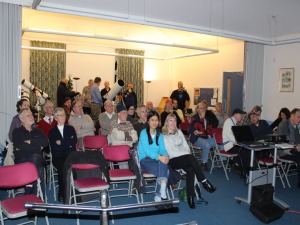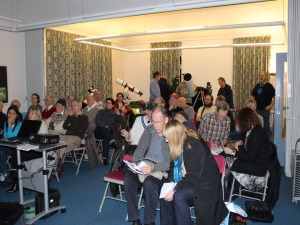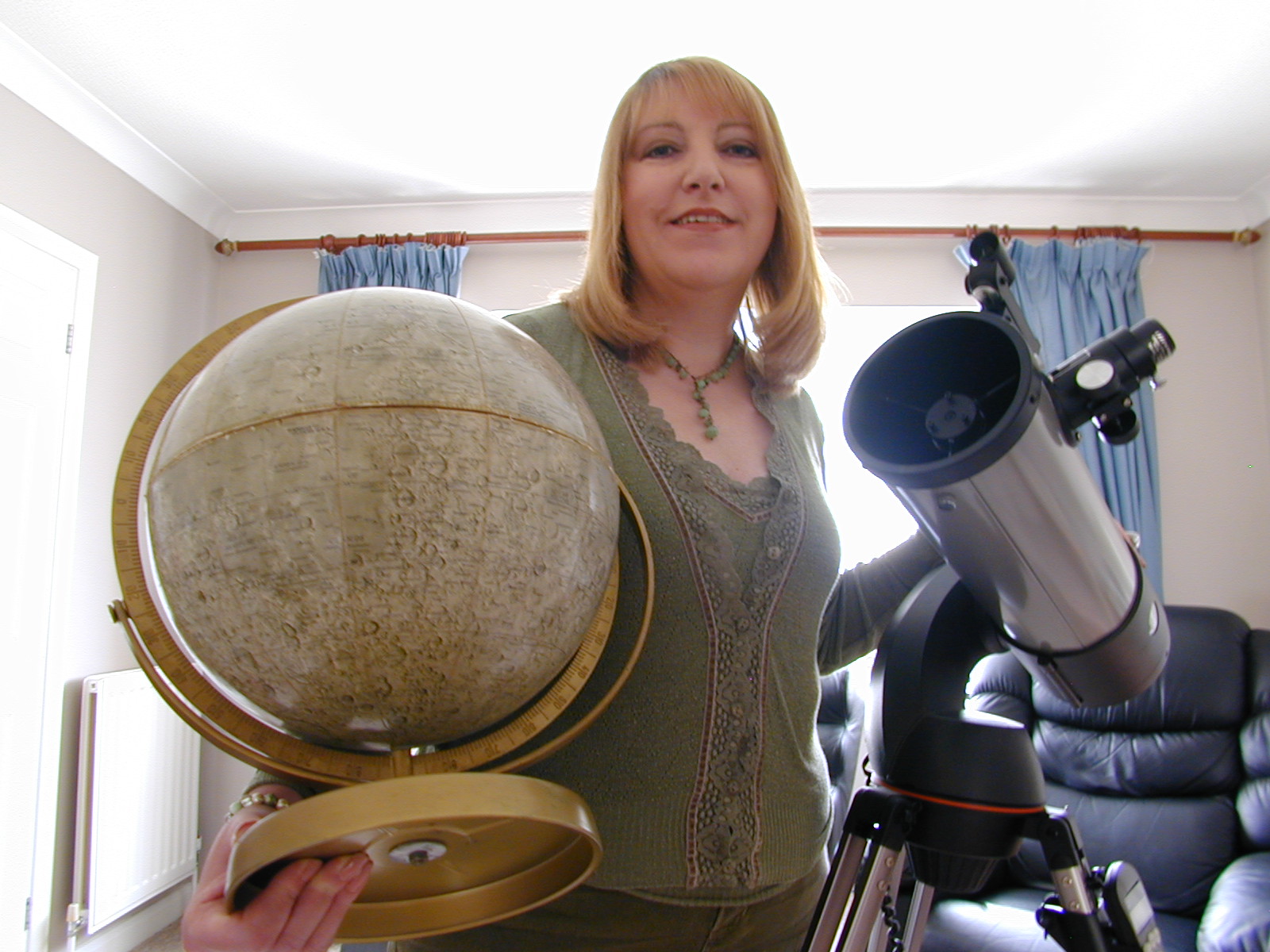We are back at our normal venue from 3rd Sept. 2021 |

This page lists our monthly meetings. For other events open to the general public, see our Events page
Dates are set well in advance but the 'content' of the meeting is only updated (from our 'meetings database') when details are entered, so 'blank' or 'TBA' may be shown when data has not yet been entered (please be assured that the meeting will take place and a talk on (some) Subject will be delivered by (some) Speaker ! )

During the COVID-19 restrictions, all meetings are being held on-line using ZOOM. Meetings are normally held at the Church Hall (aka 'The Soltau Center') of St James-the-Less, Stubbings, Maidenhead SL6 6QW, from 7.30 (for a ZOOM link, or map and directions, see the About MAS (Where we meet) page
The Main Topic is usually delivered by an invited guest speaker. We aim to provide a diverse range of subjects linked (in some way) to Astronomy - whilst the 'Second Session' is typically delivered by one of our members. If time allows, the evening concludes with a short 'What to see this month'.
Details of a typical evening (times are approximate) :- 7.30pm. The evening starts with the Chairman delivering any important Announcements and then introducing the main speaker. 7.45pm (latest). Main Topic Speaker gets up and the lights are turned off. If you arrive after 7.45, please enter the Hall by the first door (on the right, after the entrance) and please be extra careful when finding a seat at the back of the Hall as members often setup telescopes there ! 8.45-9pm +. Coffee break during which visitors often chat with members who have set-up their telescopes at the back of the hall. If the weather is good, sometimes members will nip out for a quick look at the sky. Smoking is permitted outside the Hall, however smokers are asked to avoid any 'observers' (smoke particles always seem to get into optical equipment, no matter how well 'sealed' it may be) 9.15pm (at the latest). The 'Second Session' then runs for about 45 mins, typically ending with "What's Up !" (what to look out for in the sky this month) 10pm. We aim to clear the hall by 10pm. Post meeting Observing. If the weather is good, the Observing Organiser then leads the way to our chosen observing site, or (if the weather looks even a slight bit 'iffy) members sneak off to the local Pub instead :-)
Next meeting :
(+) 7 Jun 2024 MAS 67th AGM - (Annual General Meeting)
Meetings Archive |
The meetings archive gives an 'overview' of the Society activities over the past 10 years (see also the Events page).
Members have access to the full 'History of MAS' (including AGM minutes going back to 1957) along with full names and photos
The MAS 'year' runs from September of one year to June of the following. The end of year AGM in June elects the Committee for the following year (there are no meetings in July and August - although often members will meet informally at the local pub - which gives the new Committee time to 'get a grip' on running the Society)
The "short cuts" (in the 'title bar', at the very top of this page) will take you to the June AGM entry for the end of that MAS year
The Maidenhead Astronomical Society meetings archive (last 10 years only)
Missed a meeting, or can't remember when a topic was last covered ? Here is the archive of past MAS meetings.
Note that this list covers only our monthly meetings and AGM's. Reports on Observing and Other Events are separate pages
If notes were taken at the meeting, the date below is underlined and shown with a '(+)' = click to see the notes (if no '(+)' is shown, no notes were taken - or, more likely, the webmaster hasn't found them and posted them up yet :-) )
(+) 3 May 2024 The Exploration of Venus - (Jim House)
(+) 5 Apr 2024 The Visible Universe - (Doctor Max Whitby)
(+) 1 Mar 2024 Water in the Universe - (Prof Jonathan Tennyson)
(+) 2 Feb 2024 The Mechanics of Eclipses - (Sheridan Williams FRAS)
(+) 5 Jan 2024 Telescope Parade - (and the Parker Solar Probe by Arthur White)
(+) 1 Dec 2023 SPECIAL FEATURE Herschels Lunatick Friends - (Andrew Lound)
(+) 3 Nov 2023 Binary Pulsars Einsteins Perfect Laboratories - (Barry Kellett)
(+) 6 Oct 2023 Solar Space Weather SOHO - (Dr Eric Dunford)
(+) 1 Sep 2023 The Changing Climate of Mars - (Peter Read)
(+) 2 Jun 2023 MAS 66th AGM - (Annual General Meeting)
(+) 5 May 2023 Two talks by members - (LATE CHANGE)
(+) 31 Mar 2023 Overview of telescopes and mounts - (Dave Hayes)
(+) 3 Mar 2023 Study of our Galaxy in the Era of Gaia - (James Binney)
(+) 3 Feb 2023 The Galaxy without a dark side - (Barry Kellett)
(+) 6 Jan 2023 Telescope Parade and Workshop - (by members)
(+) 2 Dec 2022 Xmas Social Photo Comp and Quiz - (set by members)
(+) 4 Nov 2022 Exploration of Jupiter - (Dr Mike Legett)
(+) 7 Oct 2022 The Lunar 100 - (Dr Lilian Hobbs)
(+) 2 Sep 2022 InfraRed Astronomy - (Dr Eric Dunford)
(+) 10 Jun 2022 MAS 65th AGM - (NOTE 2nd Friday)
(+) 6 May 2022 Gravitational Waves - (Joshua Pooley)
(+) 1 Apr 2022 Saturn - (Michael Foulkes)
(+) 4 Mar 2022 Update on the Exploration of Mars - (Jim House)
(+) 4 Feb 2022 What Astronomy Tells Us About The Origins of Life On Earth ? - (James Hough)
(+) 7 Jan 2022 Telescope Parade and Workshop - (by Members)
(+) 3 Dec 2021 Christmas Quiz set by members - (followed by Social Evening)
(+) 5 Nov 2021 CANCELLED - (Hall closed)
(+) 1 Oct 2021 Dark Nebulae - (Owen Brazell)
(+) 3 Sep 2021 How we reached the Moon - (Jerry Stone)
(+) 4 Jun 2021 63rd AGM (ZOOM on line meeting)
(+) 7 May 2021 Milestones in Astronomy - (Rod Hine (ZOOM on line meeting))
(+) 2 Apr 2021 The Red Sun - (Lyn Smith (ZOOM on line meeting))
(+) 5 Mar 2021 Tour of the Universe - (Jane Green (ZOOM on line meeting))
(+) 5 Feb 2021 Space Vehicles - (Graham Bryant (ZOOM on line meeting))
(+) 8 Jan 2021 The Astronomer's Toolkit - (Dr Lee Anne Willson (ZOOM on line meeting))
(+) 4 Dec 2020 Xmas Quiz - (set by members (ZOOM on line meeting))
(+) 6 Nov 2020 The Monster in the Crab - (Gary Poyner (ZOOM on line meeting))
(+) 2 Oct 2020 Is there anyone out there ? - (Bob Mizon (ZOOM on line meeting))
(+) 4 Sep 2020 Two eyes are better than one - (Stephen Tonkin (ZOOM on line meeting))
(+) 5 Jun 2020 COVID19 Postponed MAS 62nd AGM
(+) 1 May 2020 COVID19 Postponed The Monster in the Crab - (Gary Poyner)
(+) 3 Apr 2020 COVID19 meeting CANCELLED
(+) 6 Mar 2020 Recent Developments in Gravity Wave Research - (Martin Dyer)
(+) 7 Feb 2020 Ask an expert Q and A panel - (By Members)
(+) 3 Jan 2020 Equipment Parade - (By members)
(+) 6 Dec 2019 Xmas Quiz and social - (By members)
(+) 1 Nov 2019 The Origin of the Solar System - (James Fradgley)
(+) 4 Oct 2019 Kew Observatory and the origins of modern solar physics - (Dr Lee Macdonald)
(+) 6 Sep 2019 History of Mars Exploration - (Jim House)
(+) Aug 2019 Summer break - (no meeting)
(+) Jul 2019 Summer break - (no meeting)
(+) 7 Jun 2019 MAS 61st AGM - (and Photo Competition prizes)
(+) 3 May 2019 13 Journeys in Space and Time - (Colin Stuart)
(+) 5 Apr 2019 Space Weather - (Dr Colin Forsyth)
(+) 1 Mar 2019 The Extremely Large Telescope (ELT) - (Dr Aprajita Verma)
(+) 1 Feb 2019 Ask the Expert - (members panel)
(+) 4 Jan 2019 Equipment exhibition - (and EGM)
(+) 7 Dec 2018 Christmas Quiz and Social
(+) 2 Nov 2018 Short talks - (by members)
(-) 5 Oct 2018 The Future is out of this World - ( Dr Stuart Eves FRAS)
Friday, 5th October 2018, “The Future is out of this World” Dr. Stuart Eves, FRAS - Consultant mission concepts engineer.
With the sad loss of our Chair, Susan, tonights Speaker was asked to deliver his talk in the second half of the meeting, rather than the first
Andy, Vice-Chair
Andy opened the meeting with a update on Susan's funeral arrangements - details of which can be found on the [ Members (login) ] pages.
The Society will send a wreath. The family has asked that individuals not send flowers but make a donation to Macmillan instead. The collection tin will be available next month as well.
Members are invited to add to the Book of Condolences, which will also be made available next month.
Members are invited to submit idea's for ways to remember Susan - one that idea that has already been suggested is to name the annual photo competition after her.
A minutes silence was held in memory of Susan.

Alun H, What's Up (download PDF here)
Alun presented a quick overview of what to look for on the sky this month. The main highlights are :-
Draconids Meteor shower, peak Monday night, Oct 8/9, from 1.15am - 3am (good viewing with the new moon on the 9th, however the weather forecast is poor).
Orionids Meter Shower, peak 21/22.
The Future is out of this World. Dr. Stuart Eves
Stuart started by looking back to one of the things that inspired him. The 1971 Brooke Bond collecting card set "Race into Space". Of the 50 cards, 10 were dedicated to 'Things that will happen in the next 10 years'. Of course, they were much too optimistic. We did, eventually, get the International Space Station, however it is not nuclear powered as was predicted. There is still no real prospect of the predicted Moon Base, although they did show it being built underground, which is a lot more realistic than some of the more modern surface built structures proposed. They were spot on with their Mars rover predictions but again the prediction of humans on Mars was wildly optimistic.
In light of this, Stuart has been very restrained with his own 10 predictions for the next 10 years. many of which he feels sure will come true.
1) Satellites, especially Geostationary Satellites, will handle higher bandwidths and provide true across the world internet coverage. Projects such as Alphasat are already showing the way.
2) We will see clusters of cheaper, smaller Satellites acting together. Again, ESA has shown the way. By acting together, ad using an interferometer approach, multiple small Satellites can achieve better results. The use of multiple small mirror segments that link up in orbit will deliver much larger optical/near iR telescopes than the James Webb for a fraction of the complexity and cost .
3) Inter Satellite Links (ISL). These will become more common and satellites will connected direct to one another using laser links. This not only avoids radio interference from the Sun or other bandwidth users, but is also inherently more secure. The Eiropean Data Relay System is a good demonstrator.
4) High resolution imaging with low orbit micro-sats eg TopSat. There are many commercial applications for low cost near real-time differential imaging - that is comparing images of the same area taken at intervals of a second or two. Other applications include the ability to image disaster areas, thus allowing better control of disaster relief operations.
5) An updated version of the proposed Darwin mission exoplanet life planet hunter might well happen in the next 10 years.
6) Given our dependence on satellites, the positioning of solar flare detection satellites at the L1, L5 Lagrange points will likely happen. This should give adequate warning - 90 minutes or more - allowing satellites to be shut down or realigned to minimise damage, although if the 774 AD event was a flare, and we ever get anything like it, we will be in real trouble. On the other hand, perhaps the current low number of sun-spots means we are approaching another Maunder Minimum, in which case our satellites have nothing to worry about (for 50 years or more) although the Thames freezing over will be no picnic.
The solar flare storm of August 1972 is legendary at NASA because it occurred in between two Apollo missions: the crew of Apollo 16 had returned to Earth in April and the crew of Apollo 17 was preparing for a moon landing in December. An astronaut caught totally unaware outside the Earths atmosphere during this event would very likely have received a fatal dose.
Ed. However, with sufficient warning, they could have rotated their capsule to use the bulk of the craft as a shield for the duration of the event, some few hours. For a more detailed discussion, see here.
7) One big issue is the amount of space junk that is in orbit. Already one proposal for a new low orbit system (OneWeb) wants to use orbits that minimise the chance of running intro debris. Tracking the bigger bits means they cam be avoided, however there are hundreds of thousands of much smaller bits that can do real damage. Those putting up satellites will likely be required to de-orbit them at their end of life, although various ideas such as a 'space graveyard' might allow old satellites to be reused or recycled.
Interestingly, the solar cycle has quite an effect on space junk. The current low levels of activity means the junk is not being pushed to de-orbit as fast as high activity.
Ed. This effects all satellites - NASA engineers initially projected that atmospheric drag -- friction with the extreme upper atmosphere -- would lower Hubble's altitude and lead to a fiery re-entry and breakup by the end of the 2020s. But the amount of drag experienced by the telescope depends on the effects of the 11-year solar cycle on Earth's atmosphere. Thanks to less solar activity that usual during the current cycle, the latest projections show Hubble likely will stay aloft until late 2038 !
8) To reduce the need for new satellites, old ones could be repaired or serviced in-situ using an orbiting robot (which can be left in space for the next job, unlike the humans who serviced and repaired Hubble). Of the other hand, the use of low orbit satellites means they will always de-orbit faster that higher orbit ones. So we will likely see more low orbit satellites
Ed. Stuart's final two predictions are, perhaps, less likely to come true in the next 10 years
9) Asteroid capture / mining. Without doubt there is massive wealth awaiting the first successful asteroid miner, however plans presented so far seem far from realistic (scroll down for the Lego astronauts :-) ).
Ed. However all the proposals are from commercial ventures, so are not dependent on the whims of NASA and Congress for funding. This makes Asteroid Mining rather more likely than the final prediction
10) Mission to look for life in the seas of Europa. NASA's proposals for a lander to Europa is still awaiting finding. Should it ever arrive, it may not need to dig far to find signs of life. With no funding for the lander, the more sophisticated orbitor seems even further away.
All our indoor Meetings are open to the public, however non-members are asked to make a contribution of £2 toward the hall hire costs (this may be collected by Fred, our Membership Secretary, at the door on arrival, or left at the 'Tea hatch' at half time).
This note last modified: 11th Jun 2019 09:21.